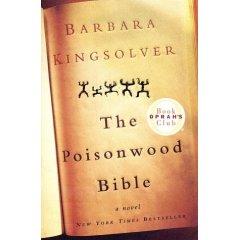
written by Barbara Kingsolver
This was a really disturbing book on many levels, yet I'm really glad that I read it. The novel chronicles the lives of the wife and daughters of a total nut case (Nathan Price) who passed himself off as a Baptist missionary to Congo in the 1960s. (You might know Congo as Zaire, which is what it was called from 1971 to 1997.) I call Price a nut case because the guy's character (or lack thereof) literally destroyed his family, alienated the very people he was trying to impact, and painted such a warped picture of God that I'm betting most readers of this novel (unless they already have a firm faith in God to begin with) will most certainly be driven further from him (God, not Price!) than before they picked up the book.
Granted, the author provides some background for why Price is such a kook, but still. It made me long to have a private moment with each reader of this book and gently explain that not all missionaries are self-seeking, condescending, holier-than-thou proselytizers whose main goal is to force Western culture onto foreign nations. There really does exist a pretty vast number of people who sacrifice their careers, wealth, comforts, possessions, and the familiarity of home in order to respectfully and humbly bring a selfless, unadulterated Gospel to people who have never heard the name of Christ. I know this because I've met people like this, even worked alongside people like this briefly in Argentina. And their goal really isn't to sweep away a culture's identity in the name of God, or to make that culture bow to the ideals of Western capitalism or even democracy.
But I digress.
The book is really well done. The main characters take turns telling their story in first-person. Sometimes the stories they relate overlap, sometimes not.
Really cool elements:
- Kingsolver does a fabulous job portraying Rachel, the sister you love to hate. She is shallow, selfish, unthinking, blonde (in every sense of the word) and generally the archetype of that annoying relative we all have -- the one you're embarrassed to share a gene pool with. Particularly witty is the way Kingsolver allows Rachel to unknowingly reveal her dimness through constant linguistic faux pas. For example: "You have your way of thinking and [Africa] has its, and never the train ye shall meet." Another one that made me laugh right out loud was, "Nelson was not going to sleep in our chicken house for all the teeth in China."
- The portrayal of Adah (one of the middle sisters, who suffers from some vague mental and neurological disorders) is fascinating. Adah is a study in paradoxes. She is brilliant yet mentally challenged; incredibly strong, yet her physical body is damaged goods. And as you read her narrative you really do get right inside her head and experience with her the pain and tragedy of her African (and then American) experience.
- Perhaps the most valuable part of this book, to me at least, was that it offers quite an education on the dramatic political upheaval that brought Congo out from under the thumb of Belgium and into its own African nation, for better or for worse. It just makes me realize how little I know of world affairs and the abhorrent corruption that often disguises itself as "aid" to poor nations. The atrocities committed are eerily similar to what is happening in present-day Iraq.
Not-so-cool elements:
- This book was torturously long, at least to me. Have I ever read a book that's 543 pages?
- As I mentioned above, it's sad that a lot of readers will come away from this book with a bad taste in their mouths about Western missionaries.




No comments:
Post a Comment